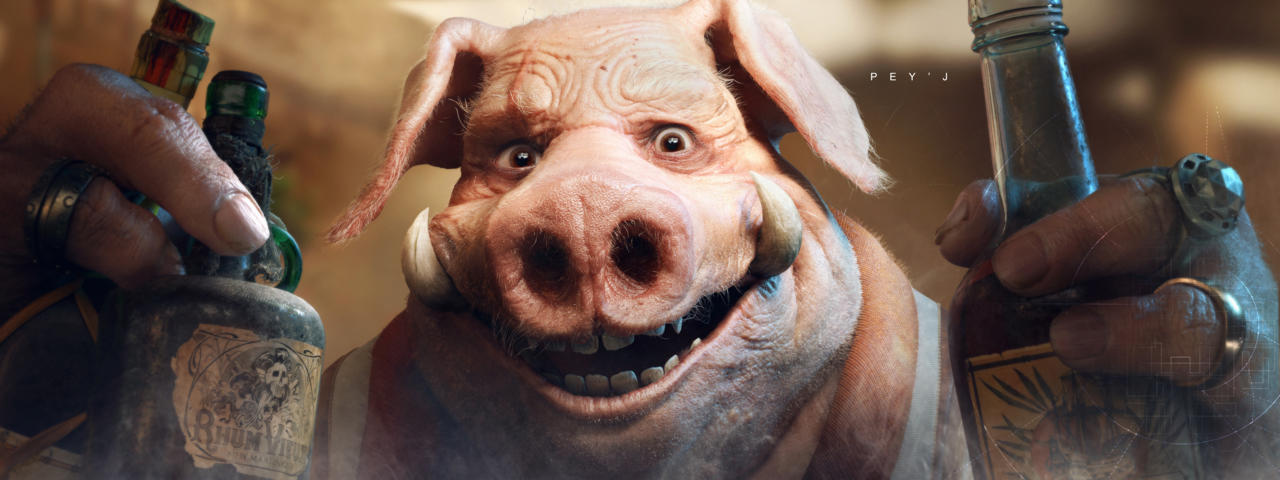If you haven’t been following the development of Beyond Good & Evil 2 closely–from its rumored existence, through to its official reveal at E3 2017, and its presence at Ubisoft’s press conference during E3 2018–it’s possible that your current feelings toward it carry some confusion. With a strong emphasis on community involvement with the Space Monkey and Hitrecord initiatives, and only brief glimpses at incredibly early tech demos, the question at the forefront of your mind is likely: What kind of game is Beyond Good & Evil 2, exactly?
Well, we think we have a pretty good idea. In a behind-closed-doors presentation at E3 2018, key developers from Ubisoft Montpellier showed us a live demo of the game, played in co-op, and it was surprising how many of the game’s systems were there, and how much there was to see.
The demo began in an underground temple, where we were introduced to the combat system. Every character in Beyond Good & Evil 2 will be equipped with a melee weapon (in this case, swords), a gun, an energy shield, a jetpack, and each one of these tools can have their behavior and abilities modified with Augments. We saw examples of a pushback ability, and a dome that could be fired to slow down anyone within it. Damage boosting and healing augments were also mentioned.
You also have a high-tech spyglass that can be used to survey your environment and get information on world objects and enemies, in what could be a nod to the camera mechanics in the original game. Planning encounters by using the spyglass was stressed as something that was particularly important, because of the fact that enemies have the access and capacity to use the same equipment, augments, and abilities as the player, which creates the danger of not necessarily knowing what you might be up against at first glance.

We watched our co-op duo explore and sneak around the temple separately before coming together to assault a squad of security guards, defending a group of scientists performing experiments on live monkey hybrids. After some quick surveillance, they engaged using a variety of gunplay and melee attacks. The melee mechanics in this early demo didn’t seem to have the impact you see in other third-person games, but there was a variety of different combat maneuvers were shown, including using slowdown domes to isolate enemies, precision shooting, using the jetpack to maneuver around the battlefield achieve better flanking positions, and using pushback-augmented weapons to break shields.
When the dust had settled, one of the players scanned the monkey still alive on an operating table, learning a bit about its backstory in the process. It was mentioned that characters like this would be recruitable for your space pirate crew. You’d also hypothetically also have the opportunity to break out prisoners from a police station and recruit them, among other options. However, what you’ll be able to actually do with your crew was not discussed.
The co-op players then exited the underground temple and boarded their vehicles–one in a single-pilot space fighter, one on a flying motorcycle–and flew out into the city of Ganesha City, an incredibly large urban hub filled with Indian architecture and neon lights–a mash of old and new, rich and poor, and populated with flying vehicles and NPCs. The players went their separate ways, and the motorcycle rider eventually got off and flew around on her jetpack, giving us a tour of the city by scanning buildings to discover their purpose–shops, police stations, a bank. The other player eventually got into a scrap with local police, engaging in a dogfight against multiple ships, and the original motorcycle rider hopped into her own starfighter and joined in.

But before engaging, they took a moment to show off starfighter customization. In a menu, they swapped out individual modules of their ship’s makeup (like cabins, wings, engines), as well as weapons and cosmetic finishes. Cosmetic ship customization will be one of the avenues where the community can submit custom art to be used within the game through Hitrecord, along with billboard spots on structures. They’ll also be able to contribute and music to the in-world radio programs.
Dogfighting looked like an arcade-style experience, with the space fighters we saw having access to two weapons: in this case, a machine gun and lock-on missiles. These weapons, we were told, can also be modified via the same kind of augments are regular weapons. We saw the two players perform barrel-rolls and loops to juke and destroy police ships high in the sky, so high that you could make out the curvature of the planet.

And then, they did something I wasn’t entirely expecting them to do. The players pointed their planes upwards and hit their hyperspeed. Looking behind them, we saw the city and its population getting smaller and smaller as they continued into the stratosphere. We looked over the horizon and saw other cities in the distance. They flew so high that we could see entire continent masses, Ganesha City now a dot on the map, and eventually reached another vehicle: A mothership owned by one of the players, a kind of giant, space battleship. One of the players left her starfighter and used her jetpack to fly around, protected by a clear spacesuit that materialized over her body like the one seen in the E3 2018 trailer.
This was all seamless, and my mind immediately went to compare it to No Man’s Sky, that is, if No Man’s Sky’s planets were filled with dense, populated cities with complex interiors. They brought up the map screen and noted that it was simply a real-time rendering of the existing game world from a fixed camera angle, and as they zoomed in and out of the continent we were directly above, we could see icons pop up representing additional cities, quests, points of interest, and undiscovered mysteries across the huge land masses.
As they zoomed out and rotated the globe, they pointed out an enormous geoglyph of a monkey burned into a nearby continent, mentioning that uncovering these mysteries would be a significant part of the game. We also panned over to take a look at the other half of the planet–a meteor-ravaged wasteland which is a significant part of the game’s world narrative, involving hybrid beings and slave labor.

But then, they kept zooming out. The screen changed from the view of the continent to a view of the planet. From a view of the planet to a view including neighboring planets, and it didn’t stop. We zoomed out to see the entire subsystem, and they eventually stopped when the map screen had a view of the entire local solar system, filled with planets, their moons, and presumably, all the game content that comes with that. The players hopped back in their starfighters, flew off into the infinite space, and the demo ended.
When asked what progression might look like–what you actually do in Beyond Good & Evil 2–the developers seemed to have a clear idea. It’s naturally a very non-linear experience, and you can likely make some good assumptions by looking at Ubisoft’s current direction with their open-world games. Ubisoft Montpellier said one of the major goals is to create a strong throughline to explore and discover more about the game’s story. The cinematic trailers we’ve seen so far follow the journey of a space crew (featuring Pey’j from the original game, as well as a younger version of Jade as their adversary), searching for a place at the ends of the universe called the Moksha Gate. Beyond Good & Evil 2 will see you creating your own customizable character, building up your own crew, and going on an adventure to try and reach it.

The Ubisoft team also explained that there would be plenty of opportunities for those that just want to fly around the galaxy and be the best space pirate. You’ll be able to take on a number of side activities that make you stronger, which might not necessarily be in service of the main narrative at all. Finally, the developers mentioned that one of their priorities was to create a fun co-op experience, as well as give the player complete freedom, so you would feel like a true pirate in a world created to be your oyster.
When asked about the game’s development progress, Ubisoft spoke about how when building this kind of all-encompassing, open-world, and systemic game, you need to build entire layers of foundational mechanics, and need to iterate on almost all of them at the same time, lest they begin to affect one another in negative, game-breaking ways. As such, all mechanical components of Beyond Good & Evil 2 are roughly at the same development level, they said.
The demo of Beyond Good & Evil 2 was impressive on a technical level despite being an incredibly early build–visually, it was certainly a lot plainer than the brief, but more detailed snippets of gameplay we saw at Ubisoft’s E3 2018 press conference. But it was surprising to witness working co-op play, the ability to explore a seamless universe with no visible loading, as well as functioning combat and vehicle mechanics. It was certainly much, much more than we were expecting to see, and we’re now feeling much more positive about the prospects of what Beyond Good & Evil 2 could be.
Beyond Good & Evil 2 currently has no announced release date.
